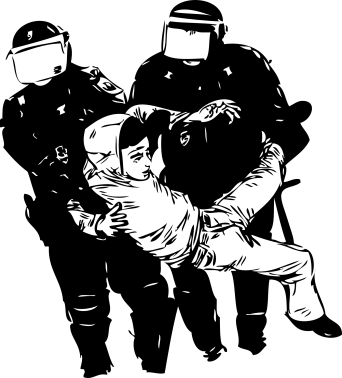STUDENT VOICES
Another black man has been shot and, subsequently, another case of character assassination post-death has begun.
Alfred Okwera Olango, 38, was killed as he pulled out “a three inch long vape” and allegedly pointed it at the police of El Cajun, California. The shooting of Olango, an “emotionally disturbed” man who was shot after his sister called 911 for help, has already resulted in justifications of why he deserved to die. Yes, he was holding a vape, but why did it look like a gun? Why was he standing like that? Why did he hold his vaporizer between his hands? Efforts to legitimize another murder, and state implicated violence, will be taken. The cycle repeats and ethical and emotional discussions surrounding these murders, along with the issues embedded in police systems, will continue to be ignored.
Respectability politics are pertinent for people of color, and for marginalized persons, the respectability of their very identity is questioned when they are victims of police misconducts. There is, for our cultural purposes, no “good” black man; if he is unarmed, as Eric Garner was, he still deserves to die and his murderer will not be charged. If he is armed in an open carry state, as Philando Castle was, it is asked why he even had a gun, or what he was doing prior to being pulled over. These men – employed, fathers, worthwhile members of their communities – are reduced to “thugs” in the wake of their deaths. As the horrific deaths play across screens, the feeling of inequality and shame arises in some while others choose to dehumanize and delegitimize the lives of victims. Even one’s commitment to serve his or her country is ignored, like the case of Anthony Hill, a veteran of the US Air forces who was killed in Georgia. There is no shield from pervasive racism, even serving our country, something that is normally highly venerated.
Perhaps “bad cops” and those who support them unwaveringly are engaging in some form of culturally disseminated ‘gaslighting’.  The methods behind this tactic, normally perpetrated by domestic abusers, can be used to warp reality for the masses. As Shea Emma Fett notes, “every time an obvious hate crime is portrayed as an isolated case of mental illness, this is gaslighting. The media is saying to you, ‘What you know to be true is not true’.” The media, police departments and their ardent supporters present the same message: a victim of police violence becomes a criminal; a father becomes a criminal, a teenager becomes a man and a boy like Tamir Rice, barely 12, becomes a threat.
The methods behind this tactic, normally perpetrated by domestic abusers, can be used to warp reality for the masses. As Shea Emma Fett notes, “every time an obvious hate crime is portrayed as an isolated case of mental illness, this is gaslighting. The media is saying to you, ‘What you know to be true is not true’.” The media, police departments and their ardent supporters present the same message: a victim of police violence becomes a criminal; a father becomes a criminal, a teenager becomes a man and a boy like Tamir Rice, barely 12, becomes a threat.
Moreover, these kinds of shootings perpetually show that there is a systematic issue, yet, in each case, there are calls to not ‘politicize’ these kinds of events. Nicole Gonzales Van Cleve, a professor in Criminal Justice at Temple University, suggests in a recent article that the shooting of Castile is the “classic case of…net widening”; essentially, police and governmental authorities victimize people of color and the poor through added surveillance. The deliberate misuse of power in these cases may be a combination of many psychological missteps, tactics gone wrong or a rotten system. Either way, they are symptomatic of larger racial issues.
So it goes; as each case unravels, the perpetrators are held up to an impossible standard rather than officers being held accountable for their actions or being given mental health checks at multiple institutional levels. The people who are killed are dichotomized. They are victims or they are thugs; or worse, they are meaningless statistics, neither martyrs nor criminals. Forgotten.
The lack of empathy, ethical concern and moral treatment toward victims of police brutality mirror the lack of concern toward rape victims. Just as women who suffer from sexual abuse are questioned unrelentingly and denied that they are victims. There are persistent voices within the media and within conservative spectrums of internet culture that ask, more or less, what did you do to cause this?
The lack of understanding that exists between races and classes, has become stagnant; the line between the other and the one is not moving, and, as such, the racialized, complex setting allows for police brutality to occur without much thought given to the lives lost to police misconduct and an inherently biased system of justice.
In December of 2015, Harvard researchers issued a report that “calls for all law enforcement-related deaths—including people killed by police as well as police killed in the line of duty—to be reported and treated as a public health issue.” The idea that police brutality is so prevalent that it is a social phenomenon and public health concern has rarely been acknowledged. We collectively become immune to our responsibilities to one another, and our ethical responsibility to reject an unjust, brutal system. Many philosophers have reflected on our core connections to one another, with some, like Kant, arguing that our inherent autonomy and respect for one another must not be eroded, and that unjust institutions cannot override embedded rights. Police misconduct can have legitimate societal impacts for all citizens’ rights and safety.
Police officers must be held to a higher standard; they are allotted incredible power and legitimate respect, and, as such, they must remove themselves from the officers who do not act in just ways. Officers and their subsequent departments must not cover for transgressing professional ethics. I cannot particularly think of any other profession wherein there is as much extensive effort to challenge the narrative of victims. Respectability politics cannot be allowed to derail conversations about changing the system of justice within this country to reflect more equity towards the treatment of people of color. Collectively, we have to do better and realize, all at once, that it is unethical and ineffective to pinpoint and criticize the value of a person’s life after they’ve already been killed. Furthermore, it is disingenuous for police departments and politicians to reflect on the value of the police as a way of shifting the focus. Yes, of course “blue lives matter,” but what about those who are characteristically attacked, or those who feel unsafe in their skin?
In Louisiana, a ‘blue lives matter bill’ was passed; yet in this state and all others, officers lives already do matter. This is reiterated every time a shooting occurs, and the extensive family life, and history of each officer is presented. They are humanized and given a context, a positive narrative. When rapist Daniel Hotzclaw was convicted, one reporter chose to reflect on his life as a potential NFL star, passed over. Characteristics like potential, and dreams and hopes, are not allotted to victims of police brutality; they are never offered this same respect and like rape victims, their actions and characters are carefully unpacked to shift the blame. Instead, many ask: What were they wearing? What were they doing? Were they holding a weapon? Did they seem ‘larger than a man,’ smaller than an officer?
The victims of police brutality are never fathers or mothers, or someone’s child. They are not humanized in regard to the people they love, or who loves them; instead, they are neat statistics, in which hungry commenters use to fit their personal or political agendas. Their stories are treated without empathy. Can we apply ethics in deciding who “deserves” to be shot and who doesn’t? Cops, and many Americans, do not reflect on their own implicit biases; if the myth of the angry black male, or criminal male, are not checked through education or other resources, our systems will continue to fail. Since some politicians have called for an ending of privatized prisons in order to stop over-policing of minority communities, certain positive outcomes have occurred such as finding that stop and frisk is unconstitutional, and the end of privatized federal prison. Further, protesting and bringing to light injustice can be incredibly productive. Education and heightened awareness of issues, and humanization of victims, not only cops, can change the narrative.
There are two efforts that must be made to address these issues. More training, body cameras and other resources, on a federal level, must be funded and provided. Screening for mental health issues, perhaps, or funding for officers who are more thoroughly equipped to deal with issues at hand must be provided. We must also attack the way we treat people with mental health issues and other marginalized persons. Transversely, and more difficult to effectuate, is the need to begin unpacking cultural implicit biases. Stop and frisk, and other police programs, have perhaps only heightened tensions and it is unacceptable to have a mainstream politician call for this unconstitutional practice to be reinstituted.
The process of fixing this incredibly broken system will not come easily. However, education and awareness, and dissolving inherent biases is critical. Police departments acknowledging fault and error and rogue officers is necessary; furthermore, the idea that a cop can be a “judge, jury and executioner” must be stopped.
Saying the names of victims and remembering that these people were victims is necessary. Hearing their stories and listening to their families’ stories is necessary. Changing bias on cultural levels and using funding and politics to fix this broken system is necessary.
So, to Keith Lamont, Freddie Gray, Walter Scott, Tamir Rice, Gil Collar, John Crawford III, Michael Brown, Anthony Hill and all others:
You were and are more than victims and statistics, and as a society, we must do better for you. ![]()
By Emily Jenab, M.A.
Written By Fordham University Center for Ethics Education
Ethical Implications of Victim Blaming in Cases of Police Brutality was originally published @ Ethics and Society and has been syndicated with permission.
Our authors want to hear from you! Click to leave a comment
Related Posts





